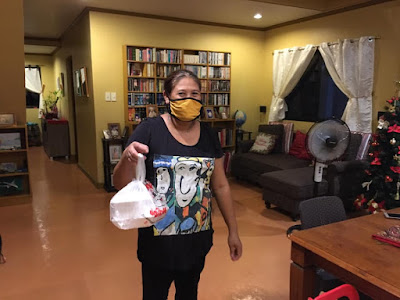Continuing from the last time, this is the story of Zennia, who served as a flower girl at our wedding.
Zennia's mom, Marjorie, has been a friend of my wife since they were in elementary school. They are childhood friends in the neighborhood. In other words, Marjorie, who now lives in the city of Iloilo on Panay island, across the sea, was born here in Silay, Negros. If I replace it in Japan, it's about the distance from my hometown, Amagasaki to Sumoto on Awaji Island. Of course, that was the time when I was on a ferry from around Osaka southern port or Kobe before the Akashi Kaikyo Bridge was built.
My wife and Marjorie's friendships would have been almost uninterrupted. Because Silay and Iloilo were a day trip away, and my wife used to work as a researcher at the University of the Philippines Miagao Campus, a 30-minute drive from Iloilo, before she married me.
Even after my wife moved to Japan, we used to go to Iloilo and Miagao on her annual homecoming. And most of the time, We met Marjorie and her family at the same time, so I had many opportunities to meet Zennia.
So for Zennia, I would have been somebody like her uncle who sometimes came from Japan. She called me "Tito" and was very friendly. In general, Filipino children call the person who are the same generation as their parents, Tito and Tita, not only to me.
Zennia also loves Japanese anime and is particularly interested in Japan. I'm a foreigner and I am as old as her parents, but we still have a lot of common topic. Recently, when I posted on Facebook that "I'm addicted to this anime on Netflix," she commented, "I've seen it for a long time." In fact, she's a much deeper anime otaku than I am.
In that way, I somehow knew what was happening on Zennia such as being a college student, having a boyfriend or hoping to get a medical job in Japan.
And eight years ago, I moved to Negros with my wife and son. I think Zennia was studying to become a nurse at that time. However, it seems that the language barrier was too high, and she gave up on getting a job in Japan. It may not be a substitute, but after working as a nurse for a year, Zennia started studying to get a doctor's license.
Just on November 26th, my wife's birthday, she posted a selfie video with delight, saying, "I passed the national exam." Congratulations, my flower girl!
Zennia specializes in Internal medicine. In the Philippines, as same as in Japan, a long education period is essential before taking the national examination. 4 years of university and 3 years of medical school, 1 year of clinical clerkship, and another year of internship. It will take a total of 9 years at the shortest. If you fail the exam, start over the next year. So I can imagine her happiness.
Zennia at the time of college graduation
"Tito" is so impressed because
a small flower girl has grown up.
It took four days for the exam itself. She told me that she made a lot of careless mistakes on the first day and cried disappointedly that night. What a stress she had!
At a medical school in the Philippines, the annual tuition fee is 120,000 to 250,000 pesos. If you simply convert this, it will be 250,000 to 540,000 yen, but considering that the average annual income in the Philippines is about 1/5 to 1/4 of Japan, it is not easy for ordinary households to pay.
Zennia, who is excellent and wonderful daughter, belongs to a government funded school. So the tuition fee was 50,000 pesos a year. Of course, she had to pay for teaching materials and practical training costs in addition to tuition fees, so still it is not cheap in the Philippines. By the way, her mother, Marjorie, is an employee of Phil Health, a state-owned health insurance company, and her father is a sailor. Moreover, both of them are managers.
The income varies greatly depending on where you work. Still the reality of the Philippines is that even if you spend so much time and money to become a doctor, the reward is not enough on average. I heard that many Filipino doctors transfer to the United States for more income. And there, they don't have to learn a new language. Not long ago, it was not rare for a licensed doctor in the Philippines to work purposely as a nurse in US.
As far as I know, my wife's cousins and uncle as a total of three families, work for the hospital in Chicago, and another cousin who was a nurse in Bacolod, quit the hospital because of too low salary and too risky job due to Corona.
To be honest from my experience of being hospitalized for food poisoning, medical care in the Philippines is far below the level of Japan. And, according to my wife who gave birth at a maternity hospital in Japan, medical equipments in this country are "antiques". This seems to be a result that is simply proportional to the amount of compensation, rather than a problem of the ability of doctors.
On the other hand, although the economy is slowing down due to the influence of the corona, the demographic dividend can still be expected, and it is growing steadily in the long run.
I hope that Zennia and her generation people, who are about to become doctors, will receive more salaries and provide high-quality medical care. And in the not too distant future, if I have the end of my life in a hospital, I definitely want Zennia to be my last doctor.














































